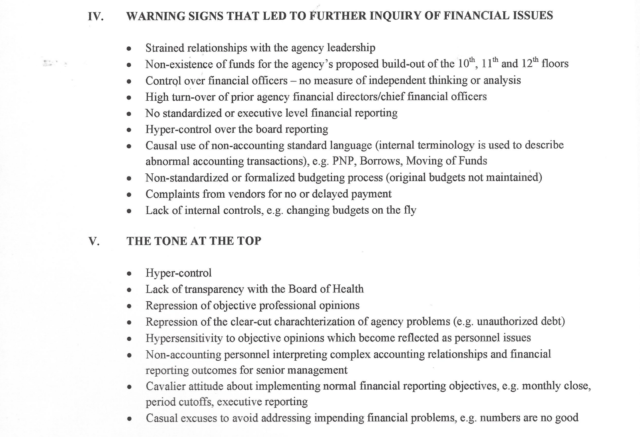(Editor’s note: This story about the Oklahoma State Department of Health was authored by Paul Monies of Oklahoma Watch and appears here in accordance with the non-profit journalism organization’s republishing terms.)
Documents released Friday by the Oklahoma State Department of Health include a summary of alleged deceptions within the agency that include fraudulent budget reports to state finance officials and omissions in reporting the agency’s financial position to the Legislature and the State Board of Health.
The records, provided in response to an Open Records Act request made by Oklahoma Watch, include an October memo (embedded below) from Health Department chief financial officer Mike Romero that outlined initial findings to the agency’s chief operating officer.
The memo, marked “confidential,” is the most comprehensive picture to date of the agency’s alleged financial mismanagement, which has led to an emergency, $30 million cash infusion from the Legislature, almost 200 job reductions and the resignation or firing of much of the agency’s former leadership team.
Highlights from the memo include:
- Debt of more than $30 million as a result of the financial maneuvers, constituting “unconstitutional indebtedness of a state agency.”
- Creation of agency “borrows,” or transfers, that amount to “fictional assets.”
- False claims that liabilities were reconciled.
- Breaching restricted federal funds, such as a fund for an HIV/AIDs program, and restricted state funds, such as revolving funds.
- Agency payroll expenses that grew to $150.8 million in fiscal year 2018, up from $132.7 million in 2011.
- Money “fronted” on contracts, including more than $13 million to the Tobacco Settlement Endowment Trust and $1.5 million to the University of Oklahoma Health Sciences Center.
- An absence of business discipline on health programs where “a wish or desire gets executed without deliberation.”
- Omissions to the Legislature and the Board of Health regarding the financial position of the agency.
The release of records comes amid multiple investigations and audits, including the state’s multicounty grand jury to explore possible criminal charges and an investigative audit by the state auditor’s office. A special House investigative committee looking into the health department heard from four top officials earlier this week, including those from Gov. Mary Fallin’s office and the Office of Management and Enterprise Services.
The memo details several warning signs that led to a deeper examination of financial issues. Among them was “hyper-control” over financial reports to the board of health and high turnover of prior financial directors and chief financial officers. There were also complaints from vendors for nonpayment or delayed payments.
Former top leaders at the agency displayed a “cavalier attitude about implementing normal financial reporting objectives” and used casual excuses to avoid addressing impending financial problems, according to the memo.
Other emails in October released under the request show top leaders responding to financial questions from OMES and the state auditor’s office, and preparing for a site audit by a federal agency, the Health Resources and Services Administration. That agency administers several grant programs, including the Ryan White HIV/AIDS Program.
Several emails from Romero and his finance team explained the urgency of the cash crisis roiling the agency. Detailed spreadsheets lay bare just how low on cash the health department was and projected when certain funds would run out of money.
“I predict the Agency runs out of Cash Position next week (Cash Position Tab),” said an Oct. 20 email to Romero from a finance employee over grants. “Also, I predict Unrestricted 400 Cash to run out the end of January, 2018 (Fund 400 Tab).
The agency’s main account for federal money is its 400 fund.
Another email exchange between Romero and Brian Downs, director of state and federal policy, talked of a “downward spiral” of cash.
“The over-budgeted payroll position plagues our cash,” Romero wrote to Downs on Oct. 16. “The fact that we have tried to shore it up with all of our funds by moving costs around plagues the integrity of our ability to repair the problem because this is where the funds ‘starving’ for cash comes into play. Years of this means that outside money is needed for a cure because it cannot cure internally. If this is the case, then clearly, this activity has created unauthorized debt for the State of OK.”
Oct. 16 memo from Oklahoma State Department of Health CFO Mike Romero
